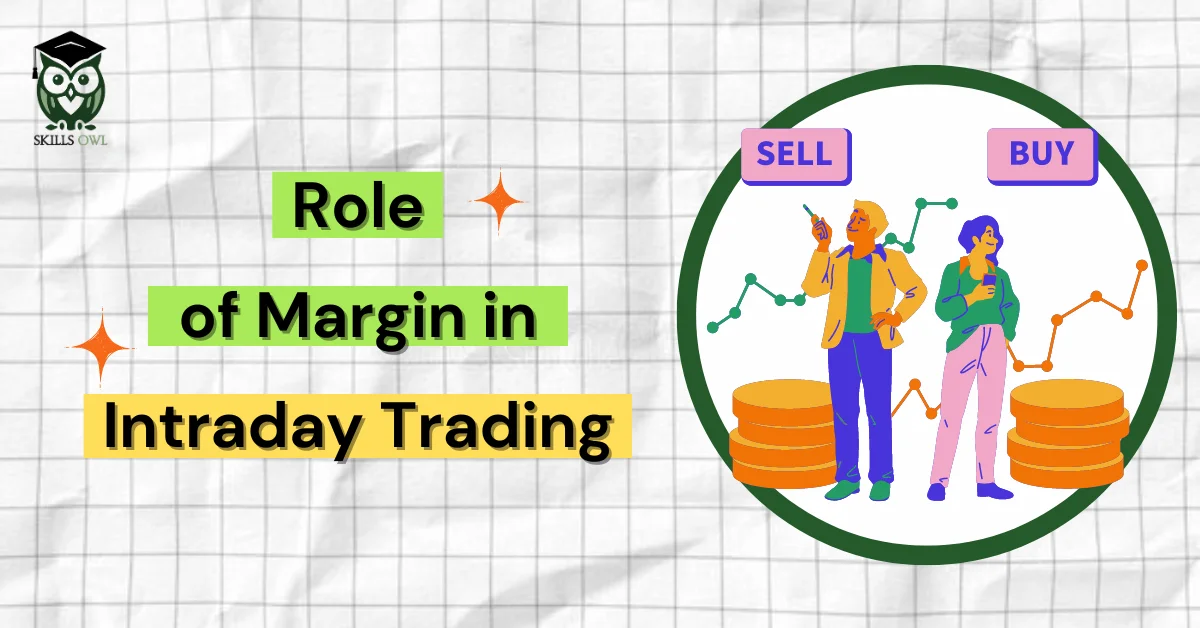
Role of Margin in Intraday Trading
Margin refers to the funds a trader deposits with their broker to start and manage a trading position. Brokers generally allow traders to engage in margin trading with borrowed funds because the margin in intraday trading involves buying and selling financial instruments (such as stocks, futures, or currencies) within the same trading day.
Intraday margin provides the opportunity to earn fast profits by completing trades within the same day so it is preferred by beginners and experienced traders. Unlike traditional trades, this method ensures that your capital is not locked up for long periods.
How does margin work in intraday trading?
When doing margin trading, a trader has to provide a small portion of the trade’s overall value (known as the margin) to the broker. The broker then loans the remaining amount and this borrowed sum helps to increase the purchasing ability and profit potential of the trader while also improving the chance of losses in margin in intraday trading.
- Leverage: When engaging in margin trading, traders leverage borrowed funds to magnify their position. For example, with a 5:1 leverage from your broker, you can trade 5000 in securities for every 1000 in your trading account.
- Margin Requirement: It refers to the lowest equity (your own funds) you need to keep in your account to begin a trade. For example, if you want to purchase 10,000 in stock with a 20% margin requirement, you should have 2,000 in your account.
- Initial Margin: It represents the minimum amount of capital or equity needed a trader must deposit with the broker to initiate a position. It usually is a fraction of the total trade value.
- Maintenance Margin: It is the minimum equity you need to have in the margin account to retain an open position. Going lower than this threshold could result in a margin call, encouraging you to either add more funds or liquidate assets to address the deficit.
- Margin Call: Market movements can increase risks and affect your position, and if your account equity goes below the maintenance margin level, the broker may issue a margin call. Now, you will either have to add more funds to your account or decrease your position size, to fix this.
Who is eligible for intraday margin?
Any investor who is interested and has the ability to do intraday trading can open a demat account and a trading account, all you need to do is submit the required documents during the account opening procedure. All traders who opt for equity trading, have the option for automatic enabling of intraday margin trading.
As an intraday trader, compare various brokers before selecting the right one. Look out for a licensed broker that provides competitive interest rates, swift processing, and top-notch trading features with a user-friendly experience. This will help you make the most of your trading journey.
Advantages
- You can quickly process intraday margins without any difficulty or lengthy paperwork. Up to 5X margin for equity intraday trading can easily be accessed. You can make use of margin calculators to make it simpler.
- Many brokers give discounted rates for margin funding.
- Intraday trading margin gives you quick access to additional capital.
- Intraday trading margins generally have lower interest rates than retail loan products.
Disadvantages
- As per the regulations given by SEBI, it is necessary to keep a minimum balance in your account and if not, the broker may liquidate your positions resulting in financial loss.
- While the chances of gaining profits are increased with intraday margin, it also magnifies the chance of losses manifold.
Conclusion
Traders wanting to enhance their liquidity and profit margins can be significantly impacted by using intraday margin. This method allows them to utilize your capital efficiently and capitalize on rapid trading prospects.
While selecting your stocks, make sure that they align with your financial objectives, period, and risk tolerance. The most important point to remember before starting with margin trading is that the journey is going to be filled with highs and lows, so brace yourself for it.
Frequently Asked Questions
Trading on margin includes risks such as increased losses, margin calls, and the possibility of exceeding your initial investment. It is important that you have a strong and effective risk management strategy when starting with margin trading.
Margin trading is usually offered for various assets such as stocks, options, futures, and currencies. Although the margin requirements and availability can differ based on the asset type and the broker.
Make sure that you have sufficient balance. In order to prevent a margin call your equity balance must be above the maintenance margin level. Apart from this, keep a check on your holdings, and consider using stop loss orders to decrease the losses as much as possible.
Yes, it is possible. As you know that margin trading involves borrowing funds, if the market moves unfavourably the potential losses may exceed the initial investment. Therefore, it is really important to be cautious and manage risks in margin trading.
In intraday trading, interest margin is usually not applied if the positions are closed by the end of the trading day. If you hold positions overnight, it may result in the imposition of market interest.
Margin requirement differs based on the broker and the asset being traded. For example, some brokers may provide intraday margins as low as 5-20% for specific stocks, allowing you to escalate your position by up to 20 times your equity.
A margin call happens when your account equity drops below the maintenance margin. The only solution to this is restoring your account to the needed level by either adding more funds or selling some positions. If you fail to do this, your broker will close your positions to make up for the loss.
